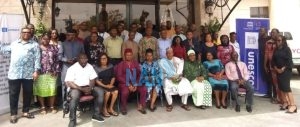
By Justina Auta
The Federal Ministry of Education (FMoE) and the United Nations Educational, Scientific and Cultural (UNESCO) are to review the Annual School Census (ASC) tools and implementation manuals in line with global trends and the SDGs.
This was made known at a three-day workshop for relevant stakeholders in selected states and education sector to review of the ASC instrument and implementation manuals on Wednesday in Abuja.
The Permanent Secretary, Federal Ministry of Education, Mr Andrew David-Adejo, said ASC helps the education sector by generating data on the number of schools by level, learners, staff, classrooms, books and facilities.
David-Adejo, represented by Mr Zubairu Abdullahi, therefore, urged the participants to contributes towards producing a reviewed instruments and manual in line with global best practices.
I look forward to the report of this workshop, especially as Nigeria really needs to improve on the credibility of data on Out-Of-School-Children, he said.
He also expressed appreciation to UNESCO for their support in the education sector, especially in the conduct of ASC to ensure Nigeria has the appropriate tools to use.
Also, Mr Mamadou Lamine-Sow, Head of Education Sector, UNESCO Abuja Regional Office, said the exercise aim at collecting accurate, reliable and timely data from schools.
It is the primary source of education data in any country. Data provides the statistical evidence for a majority if not all the education sectors policies, plans, strategies, decisions and distribution of resources.
One of the objectives of this workshop is to review our annual school census tools to be that 21st-century tool we all want it to be and to capture most of the SDG4 indicators.
With this alone, there will not be anything like no data or blank spaces when it comes to reporting globally such as with UNESCO Institute for Statistics, he said.
Lamine-Sow, represented by Mrs Ngozi Amanze, UNESCOs National Programme Officer, said they would also be reviewing the indicators for school health and child well-being to promote positive development and healthy behaviours in children.
It is important that we strengthen the capacity of the school health system to provide conducive environment for physical, mental and social wellbeing of young people and to achieve SDG 4 and the health-related SDGs.
Also, to prepare learners to thrive, learn and build healthy and peaceful sustainable futures for all, he said.
He said the workshop would educate school heads and teachers on the new integrations to the ASC tools, reduce the complexity of completing the questionnaires and improve the understanding of the school administrators to efficiently complete the assignment.
He reiterated the commitment of UNESCO towards supporting the education system, adding that the workshop was part of UNESCOs Our Rights, Our Lives, Our Future (O3) Programme.